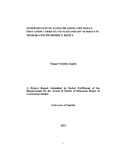| dc.description.abstract | The purpose of the study was to investigate the mainstreaming of Life Skills
Education curriculum in secondary schools in Tharaka South District.
Specifically, the study sought to establish the approaches used in teaching LSE
and how they influence mainstreaming of Life Skills Education (LSE); assess the
attitudes of secondary school learners towards mainstreaming of LSE, and there
by determine whether in-service training equips teachers with knowledge
necessary for mainstreaming LSE. It further assessed availability and adequacy of
teaching and learning resources and their influence on mainstreaming of LSE; and
established whether co-curricular activities in secondary schools influence
mainstreaming of LSE in the district.
The study was guided by the Social Learning Theory as postulated by Albert
Bandura. Descriptive survey research design was adopted for the study. A sample
of 50 teachers and 150 students was selected from a population of 114 teachers
and 1,413 students using proportional, simple random sampling technique.
Questionnaires were used to collect data from teachers and students. Statistical
package for sciences (SPSS) was used to analyze quantitative data.
The study established that LSE had not been adequately mainstreamed in schools
across the district, and that half of the students did not have access to LSE. There
was no common methodology on teaching of LSE. The subject mostly went unassessed.
LSE was allocated to teachers at random irrespective of whether they
had prior training. It was found out that teaching and learning approaches such as:
discussion on relevant topic, having debates on relevant topics, having story
telling sessions on different topics, use of case studies on how to solve particular
social problems, use of invited resource persons with required life skill, having
sessions for question and answers and the use of songs and dances on relevant
themes were inadequately used in teaching and learning of life skills education. It
was also found out that most teachers had not been trained on life skills education
as indicated by 93% of teachers’ response. It was also found out that students had
positive attitude to the learning of life skills education. Regarding the level of
availability and adequacy of teaching and learning resources, such as; text books,
magazines and newspapers, charts, posters video tapes and audio tapes on life
skills education were available but inadequate in most secondary schools.
The study established that students participated in co-curricular activities in
secondary schools which included: debating clubs, family clubs, peer counseling
club, journalism clubs, Debating club, Football competitions, Health clubs and
Peer counseling club which they responded that they helped them to develop
positive behavior, communicate effectively, build health relationship among their
peers and be assertive. In view of the findings it was recommended that the funds
should be availed by the Ministry of Education to procure specifically life skills
teaching and learning resources, teachers to use variety of instructional
participatory approaches and learners to be involved in wider learning activities.
Ministry of education was also recommended to review current assessment
approach of LSE and enhance effective mainstreaming of LSE through
monitoring.
The study concluded that most secondary schools were inadequately equipped
with instructional materials for mainstreaming LSE curriculum, there was no
common instructional approaches (methodology) mostly used by teachers to teach
LSE, most activities students engaged in mainstreaming LSE and learning process
were too narrow; and that LSE was not allocated in the time table in most of the
schools. The subject mostly went un-assessed.
The finding of the study may be significant to Kenya institute of education to
inform them on the need to revise training of curriculum to incorporate life skills.
From the findings it was recommended that the teachers should be trained on life
skills to enhance effective mainstreaming of life skills education curriculum in
secondary schools. In view of delimitations of the study, it was suggested that
further research be conducted covering the entire Tharaka south district. Similar
research should also be conducted in private schools. | en |

